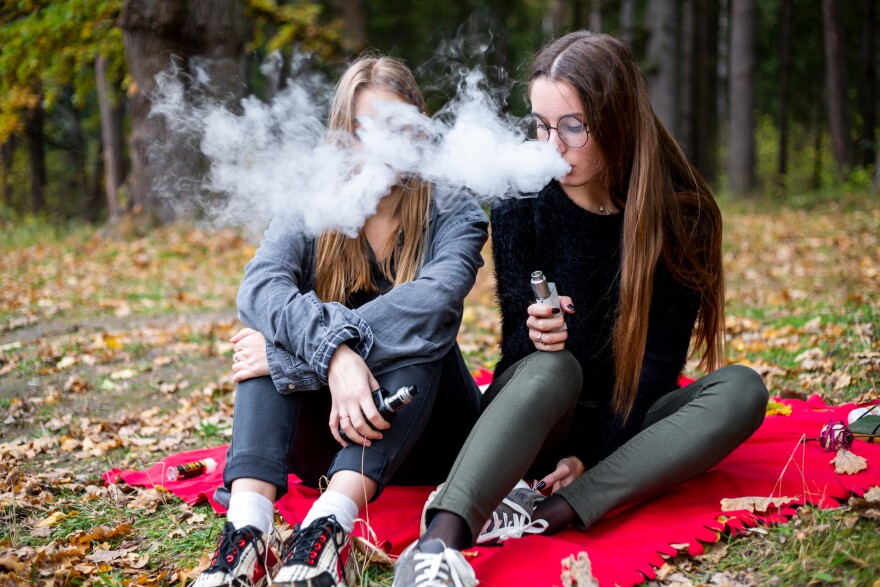A new study shows the rates of teens engaging in daily nicotine vaping have nearly doubled in the last five years.
The same goes for daily users who tried and failed to quit.
Dr. Davika Rao, an associate professor of pediatrics in the division of pulmonology and sleep medicine at UT Southwestern Medical Center, says it’s clearly a case of addiction. She told KERA’s Sam Baker vaping products are worse today than a few years ago.
Dr. Rao: And this isn't really surprising given the potency of the nicotine in these products. It's much more potent than even previous generations of vapes. These products contain nicotine that deliver a very potent dose to adolescents who use these products. And kids have developing brains. They're much more prone to developing addiction compared to adults.
So the combination of enticing flavors, potent nicotine, media exposure through clever marketing, as well as powerful vapes, it's not surprising that kids are becoming more addicted compared to even just a few years ago.
Baker: So, are you saying the products now are more powerful than then?
Dr. Rao: A lot of these products now contain synthetic nicotine. Toxicologists who do research studies found that synthetic nicotine is much more potent compared to previous formulations of nicotine.
And in addition, the types of vapes that are available now contain much more dosages of nicotine compared to before.
For example, there's vapes that contain 5,000, 10,000 puffs. And some of these vapes have the nicotine equivalent of 12 packs of cigarettes or more.
Baker: And I'm thinking a few years back when there was all the concerns about the flavored vapes. There were efforts being made to go after companies that actually produce those. Are they just ignoring that totally?
Dr. Rao: So, I think there is a gap between policy and enforcement that we have found, even with the federal “Tobacco 21” law was a great law stating that you have to be 21 to purchase tobacco products. But unfortunately the enforcement of these policies is quite difficult.
A vape or e-cigarette, it requires approval by the FDA to have that device available on the market. However, it appears that in practice a lot of retailers carry many, many products that are actually not supposed to be on the market and are illegal.
Baker: Who's most likely to use vapes now?
Dr. Rao: The age group that has the highest usage is the young adult group, the 18 to 24-year-olds. And that's followed by adolescents younger than eighteen years of age.
Baker: I understand there are increases now though among what females, non-Hispanic black youths and rural adolescents as well?
Dr. Rao: These groups I think suffer a lot more mental health effects perhaps than other comparable groups. And there's also a lot of evidence to suggest that those kids that have more stress, that have more mental health problems, that they're more likely to use these products.
And in addition, the products themselves are associated with mental health effects. In other words, I have patients that say, well, I started using these products for anxiety and depression, but it seemed to actually make it worse. I think it's possible that these groups are under more stress compared to others.
Baker: You co-authored recommendations for treating nicotine use in adolescents under eighteen. Is there one particular recommendation that towers above the others?
Dr. Rao: The strongest evidence was for counseling to help adolescents quit using tobacco products. And some studies actually used a combination. They used technology-based programs, such as those via computer or a text messaging kind of program. And using that in combination with counseling did appear to be effective.
The other therapeutics that seemed to be effective were medications, actually. And those medications include varenicline and brupropion with some caution. You have to exercise some caution in those groups that have some mental health concerns. But these are the therapies that we have, and we did find in studying those therapeutics that those were the ones that appear to be the most effective to help adolescents.
But again, the other main takeaway from doing this expansive literature review is that more studies need to be done, and specifically with respect to vaping and e-cigarettes, and now nicotine pouch use is on the rise.
Baker: Is there anything else you'd like to add before we conclude?
Dr. Rao: I think that kids using these products isscary to parents, and I think parents can feel somewhat helpless. But I want to get the message out there that they should feel empowered.
They can start talking to their kids when they're young, even 10, 11 years old, and talking to them in a very non-judgmental, open-ended manner. What do you know about these products? Do you have friends that use these products? Do you know anything about how harmful these products are? And that opens the conversation to what kids know.
And parents and caregivers, they can educate kids on what the harms are of these products before they learn about these products through, for example, social media or through friends.
Baker: So the first effective step may be at home.
Dr. Rao: Yes, prevention is really, really key.
RESOURCES:
Teen Nicotine Vaping Trends Show Powerful Evidence Of Addiction
Vaping in public places will soon be illegal in Dallas. Here’s what you need to know



